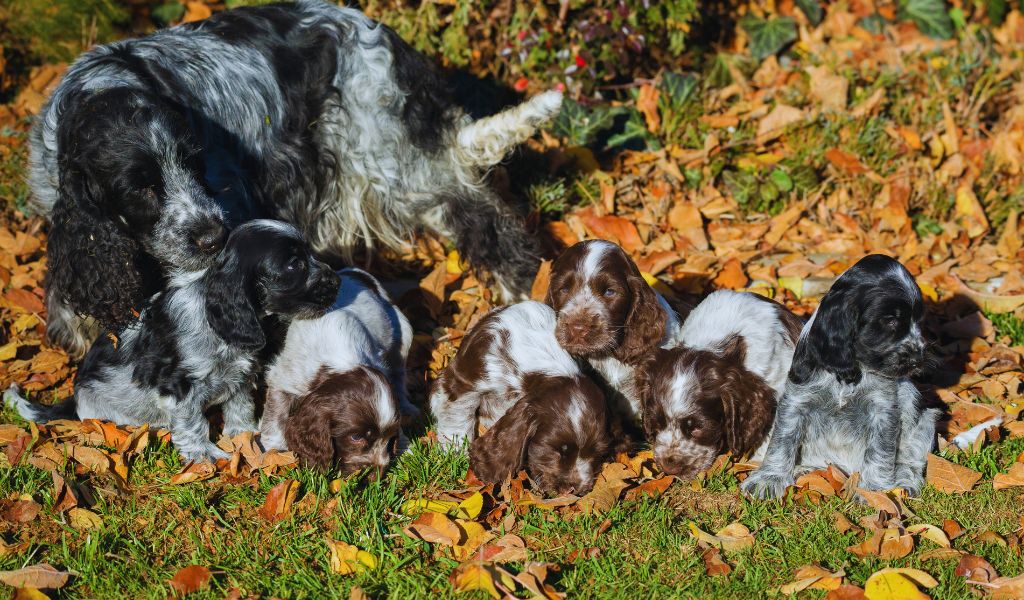Feeding a Cocker spaniel puppy correctly is crucial for its development and health.
This breed, known for its energetic nature, requires specific dietary attention to thrive.
The guidelines provided here will help you understand how much food your puppy needs, which types of food are best, and how to handle common feeding issues.
A Cocker spaniel puppy needs feeding about half a cup of good quality puppy food four times a day until it is six months old. As the puppy grows increase the amount in line with the food manufacturer’s recommendations.
Understanding the Nutritional Needs of Cocker Spaniel Puppies
Requirements: How Many Calories Does Your Puppy Need?
Cocker spaniel puppies are lively creatures who expend a lot of energy in their daily play and growth.
Typically, a Cocker spaniel puppy needs between 400 to 600 calories per day, depending on their age and activity level.
These calories should come from high-quality puppy food designed to support their development and energy needs.
Key Nutrients for Optimal Growth
The right balance of protein, fats, and carbohydrates is essential for your puppy’s growth.
Protein helps build muscle and supports tissue repair, while fats provide energy and aid in the absorption of vitamins.
Carbohydrates are necessary for quick energy. Additionally, essential vitamins and minerals like calcium and phosphorus are crucial for bone development.

How Much to Feed: A Guideline for Cocker Spaniel Puppies
Feeding Schedules: How Often Should You Feed Your Puppy?
During the first few months, it’s best to feed your Cocker spaniel puppy four times a day.
As they grow, you can reduce this to three meals per day by the time they are six months old, and down to two meals per day after one year.
Portion Sizes by Age: A Detailed Breakdown
For the initial weeks, puppies require small but frequent meals.
As a general rule, puppies aged two to four months should be fed about ¼ to ½ cup of puppy food at each meal.
Adjust the portion sizes as they grow, based on their health and energy levels, as well as guidance from your vet.
Adjusting Food Quantities as Your Puppy Grows
It’s important to adjust your puppy’s food quantity as they grow.
Regular weight checks will help you determine if you need to increase or decrease their food intake.
A puppy that is gaining too much weight may need its portions reduced, while a puppy that isn’t gaining enough may need more food.
Choosing the Right Puppy Food for Your Cocker Spaniel
Wet Food vs. Dry Food: Which Is Better for Puppies?
Both wet and dry foods have their advantages for puppies.
Wet food can be easier for puppies to eat and more enticing, while dry food can help maintain dental health. Many owners opt for a combination to balance these benefits.
Recommended Puppy Food Brands and Products
There are several high-quality puppy foods on the market specifically formulated for small breed puppies like the Cocker spaniel.
Brands such as Royal Canin, Hill’s Science Diet, and Eukanuba all offer products tailored for the nutritional needs of growing puppies.
Common Feeding Issues and Solutions
Overfeeding: Recognizing and Preventing It
Overfeeding is a common issue, especially with breeds prone to obesity like the Cocker spaniel.
Signs of overfeeding include excessive weight gain and loose stools. Monitoring your puppy’s weight and adjusting their food intake accordingly can prevent this.
Underfeeding: Signs and Solutions
Conversely, underfeeding can lead to malnutrition and developmental issues.
Signs that your puppy may not be getting enough food include lethargy and a thinning coat. If you suspect your puppy is underfed, consult your veterinarian for advice on adjusting their diet.
How to Transition Your Puppy to Adult Dog Food
When to Start the Transition
Typically, Cocker spaniel puppies should start transitioning to adult dog food around 12 months of age.
This transition should be gradual over a period of 7 to 10 days to prevent digestive upset.
Tips for a Smooth Dietary Change
Mix increasing amounts of the new adult food with decreasing amounts of the puppy food.
Monitor your puppy for any signs of distress during this change, and adjust the transition speed if necessary.
Frequently Asked Questions About Feeding Cocker Spaniel Puppies
How do I know if my puppy is getting enough food?
A well-fed puppy is energetic, has a glossy coat, and maintains a steady growth rate. Your veterinarian can help you assess if your puppy’s dietary needs are being met effectively.
Can I give my Cocker Spaniel puppy human food?
While some human foods are safe in small quantities, others can be harmful. Foods like chocolate, grapes, and onions should be avoided. Always consult with your vet before introducing new foods to your puppy’s diet.
What should I do if my puppy refuses to eat?
Puppy appetites can fluctuate with growth spurts and teething phases. If your puppy refuses food, try offering a different brand or type of food, and ensure the food is at room temperature. Persistent refusal to eat warrants a vet visit.
How can I measure my puppy’s food portions accurately?
Using a standard measuring cup for pet food is the best way to ensure accurate portion sizes. Avoid using household cups as they can vary in size.
Are there any foods that are dangerous for my puppy to consume?
Yes, certain foods that are perfectly safe for humans can be toxic to puppies. Common examples include chocolate, xylitol (found in sugar-free gums and candies), grapes, raisins, onions, and garlic. Always keep these foods out of your puppy’s reach.
Proper nutrition is the cornerstone of a healthy life for your Cocker spaniel puppy.
By following these guidelines, you can ensure your puppy grows into a healthy, happy adult dog.
Remember to consult your vet regularly and adjust the diet as needed to cater to your puppy’s unique needs.




